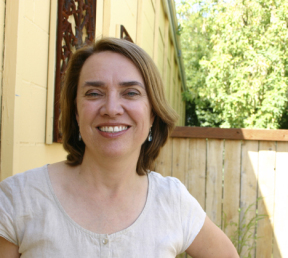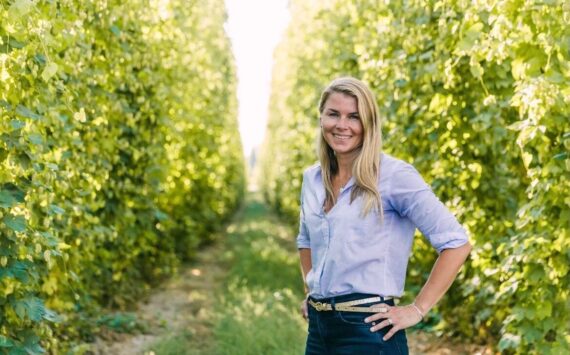EDITOR’S NOTE: This article is part of a series of interviews with candidates running for Tacoma City Council. For earlier interviews with contenders Marty Campbell, Jonathan Phillips, David Curry, Marilyn Strickland, Harold Moss, Donald Powell, Jack Pleasant, and incumbent Spiro Manthou, visit the Index archives online.
Tacoma City Council candidate Lauren Walker’s connection to the Hilltop neighborhood dates back to 1990, when she and her husband, Marcus, relocated there from the East Coast. Though the neighborhood has seen improvements over the years, Hilltop in the early-1990s was defined by its drug dealers and gang-related turf wars.
“When we moved in, things were really hot,” said Walker, during an interview with the Index last week. “It was a major case of buyer’s remorse when we realized our house had been a drug house. We had to clean things up. We got involved on a community level, and things really changed.”
Why did they choose to live in the Hilltop?
“It was the only place we could afford to buy a house,” she said. “But also, in Boston, we lived in a community rich in diversity, and we valued that. It was a real choice, knowing there were problems certainly with the perception, but also knowing that even when you live in those kinds of neighborhoods, there are great people and it’s a great opportunity to make a change.”
In 1991, Walker joined Hilltop Action Coalition (HAC) — she was board secretary for six months before serving as HAC’s president for nearly three years — as a way to improve her neighborhood.
Grassroots advocacy — specifically working with seniors and individuals who have faced housing discrimination and affordable housing challenges — is a thread that runs through her professional career. Since 1995, Walker has served as executive director of Fair Housing Center of Washington, an organization that aims to ensure the civil rights of citizens across Washington State by investigating complaints of housing discrimination.
Prior to joining the center, Walker was an ombudsman for Pierce County Department of Aging and Long Term Care; she was tasked with sharing information and providing outreach regarding long-term care issues affecting seniors and people with disabilities.
On the East Coast, she worked at Somerville Cambridge Elder Care Services, in Cambridge, Mass., where she tackled advocacy and lobbying efforts for the organization.
Today, Walker, 49, is running for the District 3 position on Tacoma City Council. In April, incumbent Tacoma City Councilmember Tom Stenger announced he would not seek re-election, and a looming vacancy has drawn four candidates: Walker; Rev. Ronnie Allen Warren; Hilltop activist Jack Pleasant; and Tacoma attorney and former pro tem judge Donald Powell.
Walker appears to be the front-runner. She’s received endorsements from six of nine current councilmembers, Pierce County Democratic Party, Washington Conservation Voters, and several former mayors and councilmembers. According to the latest Public Disclosure Commission report, she has raised $15,604 for her campaign. She has also led an exhausting campaign knocking on doors to introduce herself to residents throughout the district.
Walker lives in the Hilltop neighborhood with husband Marcus (he is managing artistic director of Lakewood Playhouse) and two sons — Henry and Reuben. I met her at Mandolin Cafe last week to discuss her campaign, concerns in the district, and how her experience on issues of fair and affordable housing, community organizing, and assisting seniors might inform her work if elected to City Council.
TACOMA DAILY INDEX: In the time you have spent doorbelling, what are you learning from people that, if elected, you would take to City Hall?
LAUREN WALKER: First of all, it feels like a gift to me to be able to go out and talk to people. It gives you faith in humanity to go door to door and realize people are paying attention. They read the newspapers, they’re watching the news, and they are processing things. The kinds of issues that they are talking about? Everybody is talking about roads. Probably 90 percent of the people, when I ask what their issues are, they talk about the potholes in the roads, or they wonder why their street doesn’t have sidewalks, or why two streets over a road was paved and theirs wasn’t. Safety is a big issue, too. Police presence. People want to be safe. They want to know that the City officials and staff, whether police or fire or other services, respect their opinions so that when they call for some kind of service, they get respect. Sometimes they do, sometimes they don’t. They want to know where they can go when they have a problem, so they can get action. What would I do about [these things]? Make sure that we find a way to address the roads situation. Though the levy failed citywide, it did not fail in District 3. It didn’t fail in Councilmember Jake Fey’s district, either. That shows that there are two possibilities. One, there were certain segments that didn’t mind the idea of their taxes going up a little bit so they could start working on the roads. But, really, looking for funding so that we can start addressing the issue. I think we can all agree it’s pretty ridiculous, especially in certain areas. In terms of public safety, I think it’s twofold: making sure people are aware there are neighborhood councils where community-based police officers are there on a regular basis once a month, and there’s a real opportunity to build a relationship with them and talk to them about their problems. Also, making sure there are enough police officers. I think we are down 20 police officers right now, and many police officers are retiring. So even as there is an effort to hire police officers, there are people going out the door.
INDEX: Why have you decided to run for City Council?
WALKER: I’ve been an advocate all my life. I’ve been very public-minded all of my life, too. For the last 25 years, I’ve been working at various levels of advocacy. Currently, I am doing civil rights advocacy. Before that, I was doing health care and senior advocacy work. And I’m also doing housing advocacy work, as well. With that, there have been a lot of tentacles into different kinds issues. Also, I have a degree in Community Services / Public Affairs, and that has a minor in community organization. I’ve just been very involved in community issues, and fighting for the underdog. I grew up in a family where my father was a conservative Republican, and my mother was a liberal Democrat. There was always a charged atmosphere in talking about political issues. At a very young age, I was probably about 13, my dad slammed his fist on the table and said I should run for City Council. That was the first glimmer in my head of what is City Council, what is public office, and what that means. So, for a long time, I have been very interested in what you can do as a public official. It’s been in the back of my mind, actually, from a very early age. I’ve really been thinking about it much more seriously for the last few years. It’s been wonderful to just bring in all my community contacts through the neighborhood and housing groups I work with, and all the different advocacy elements.
INDEX: How would you describe the affordable housing scene in Tacoma right now?
WALKER: In doorbelling, when I talk about affordable housing, everybody says, ‘Boy, do we need affordable housing.’ People are really hurting financially, and the prospect of housing prices going up is really scary. Even though it’s a sign of the health of a community to see that housing prices are going up, it makes it more difficult for people to live in them. I’ve been involved on a number of different levels. Going back to the Hilltop, one of the things we saw in the early-1990s was that in addition to block organizing and working with police specifically on crime issues, we also looked at the home ownership rate in the Hilltop. What the percentage of homeowners there was flipped from what you wanted it to be. There was 40 percent homeownership, and 60 percent renters. We wanted to find a way to change that. We started the Hilltop Homeownership Center at the time. The focus of that was to actually do infill housing and get first-time homebuyers in there. It’s had an incredible effect. I don’t know if you have been down the 23rd and 25th Street corridor, but almost all of the new builds down there are from the Homeownership Center of Tacoma. And then you see it through the Hilltop, too. That made an incredible difference in just giving stability to the neighborhood. I’m also on the affordable housing consortium, which is made up of a lot of affordable housing providers. The goal is to make excellent and affordable housing that is well-managed throughout the community. Salishan, I think, is an incredible success story. What Tacoma Housing Authority is doing in that complex is wonderful. They are trying to maintain the diversity in the community, they’re doing mixed-income there, and they’re looking at services and employment opportunities they can provide. The more that we can do that kind of model, the better.
INDEX: Have there been any recent City Council decisions you have disagreed with, or thought you would have made a different decision based on your background?
WALKER: Yes. Living through this Special Needs Housing Moratorium was very difficult for me because I think that though the intent was good — the City Council was responding to a specific neighborhood concern — the approach went beyond that specific neighborhood concern to a more far-reaching affect. It went from sex offenders to group homes. Though, yes, it’s true there are sex offenders that live in group homes, there are also a lot of disabled people living in group homes. There are a lot of seniors living in group homes. There are a lot of children living in group homes. And there are a lot of sex offenders that aren’t living in group homes. In fact, probably a majority of sex offenders don’t live in group homes. So it became this totally charged frenzy of City staff trying to listen to their constituents and neighbors, and neighbors taking things beyond the sex offender issue. Everyone was trying to approach many different problems, and no one was happy with how it came out. You talked to the housing advocates, and they weren’t satisfied. Neighbors weren’t satisfied. I would have liked to have seen that really specifically articulate on the first issue, and be more circumspect in adding all the different layers.
INDEX: When you think back on your work on the Hilltop Action Coalition, what experiences stand out for you?
WALKER: I think the main thing we got done was that we galvanized the community to not only fight the problems that were happening, but also be able to give a voice to what we loved about the community. This is back in the early-1990s, and it was a very different community back then. Not entirely different, but it was more charged in terms of the kind of violent situations we were dealing with. Being able to proactively work together as neighbors, and also work with police and social service agencies toward a common goal, it was an incredible experience. We held meetings all over the Hilltop. We were compartmentalized into all these different sections, and had an incredible group that was very organized in terms of every area had a certain number of block leaders. I really believe that kind of intense interaction with each other helped us be more effective at what we did. Not be just a lonely voice, but verbalize together where we wanted to go. There was a wonderful turning point where we all of a sudden started talking about beautification issues. We didn’t want to just focus on crime. We planted trees back in the early-1990s, and had this huge planning process. We did a whole study where we looked at the condition of the houses in the Hilltop, just to get a sense of what kind of problems we had, and what kind of support we needed. It’s similar to what’s being done now. It’s just that it was so much worse back then.
INDEX: Do you think the Hilltop neighborhood has shaken its image of the early-1990s?
WALKER: I would like to say yes. But going back to doorbelling again, I do voter education when I’m out there: ‘Do you know you are in District 3 and what the boundaries are?’ Most of them don’t. There’s a lot of comments made about, ‘Oh, those crazy people in the Hilltop. How can they live there?’ I will say, ‘Well, I live there.’ We’ll make a joke out of it. But there is still this view to a lot of people that it’s still a dangerous place to be. But there are a lot of people I meet out doorbelling who say, ‘Wow, you guys really made a difference up there.’ To those of us that live there, that makes us feel a sense of accomplishment and relief that people are viewing us that way. Even back in the early-1990s, we loved living there. It was only a few people that were making it bad for us. It was just a concerted effort toward cleaning that element up. Some of the work I’m doing now continues to help the image. I was on a committee where we put together a Hilltop restaurant map. We worked on that just so that we could have that out at local businesses in the community to promote the wonderful restaurants around the Hilltop. I’m working on Music and Murals, the event at People’s Park. There has been a hiatus, but now we are bringing it back because it’s a celebration of the Hilltop community. There are those of us in greater Tacoma or locally who have been able to watch the change and know steps have been taken.
INDEX: Would your background in fair and affordable housing, and working for seniors, guide you as a councilmember? Would they be on your mind in trying to direct city policy?
WALKER: Once a senior advocate, always a senior advocate. When you are talking to registered voters, it’s amazing how many of them are over the age of 70 — and 70 seems young at the door. There are a lot of 80- and 90-year-olds out there. It’s fabulous talking to them about their perspectives and what their needs are. There’s a very astute group of voters who are concerned about housing prices or worried about tax relief or different things. But they also have a perspective of what the needs are in the community. I think one thing I can offer the council is just having a knowledge-base of affordable housing, and be able to support any policy directions that they’re going.










